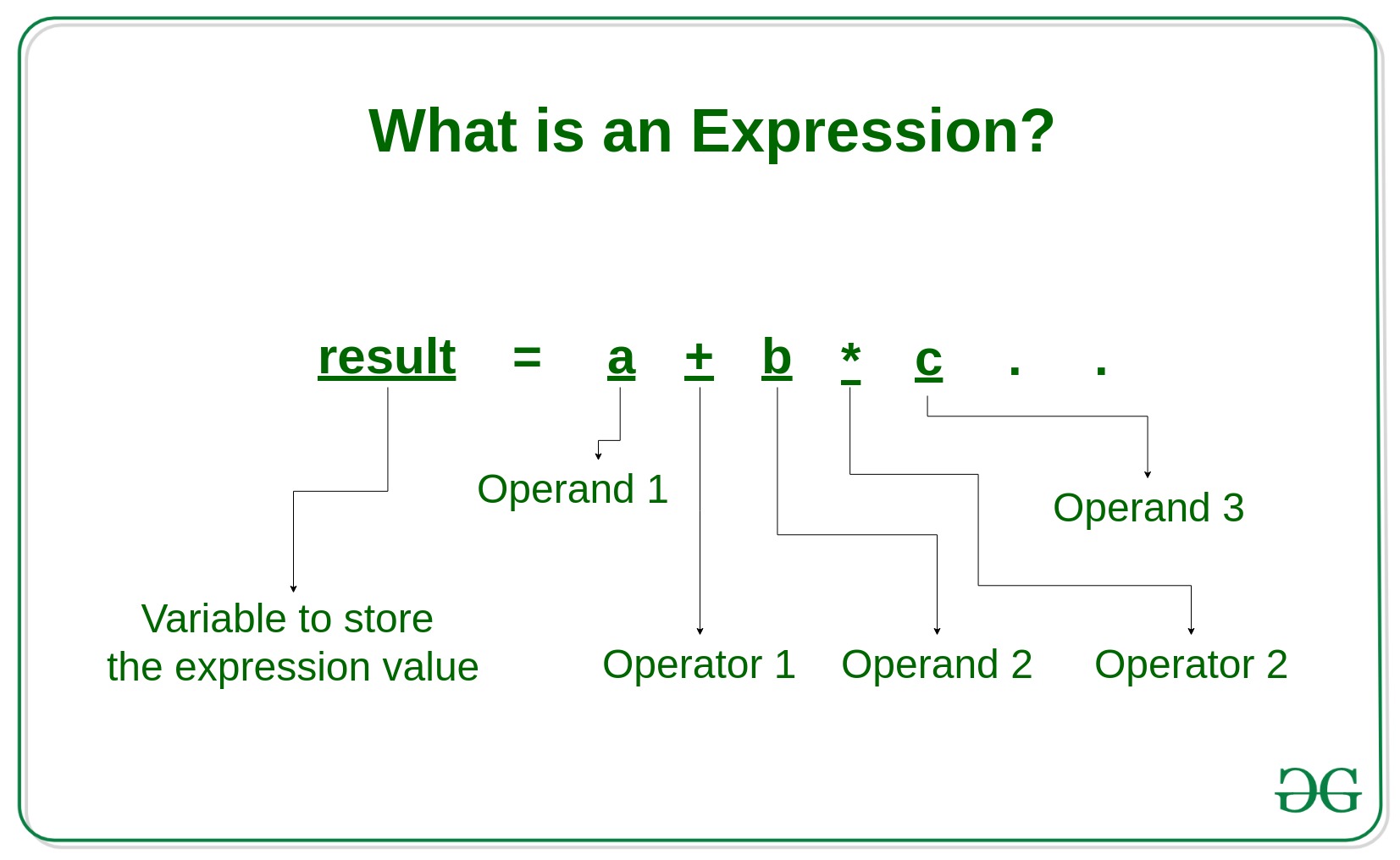Expressions#
Overview#
Definition
An expression is a combination of variables, constants, operators, and function calls that can be evaluated to produce a value. It can be as simple as a single variable or as complex as a series of nested function calls and operators. Expressions are commonly used in C++ to perform calculations, assign values to variables, and make decisions.
Characteristics
Operators
Expressions involve operators, which are symbols that represent specific operations. Examples of operators include addition (+), subtraction (-), multiplication (*), division (/), and comparison operators (==, !=, <, >, etc.).
Operands
These are the values or variables that the operators act upon. For instance, in the expression 5 + x, the values 5 and x are operands.
Values
These are constants, literals, or numeric representations that can be used in expressions. In the expression 2 * 3, the values 2 and 3 are used to calculate the product.
Variables
Variables are placeholders for values that can change during the program’s execution. Expressions often involve using variables to create dynamic calculations.
Function Calls
Functions can also be part of expressions. A function call evaluates to its return value. For example, in the expression sqrt(25), the function sqrt calculates the square root of 25.
Precedence
Expressions follow operator precedence rules, which determine the order in which operators are evaluated. Parentheses can be used to override the default precedence.
Evaluation
The process of evaluating an expression involves substituting values for variables, applying operators, and calculating the final result. The result of evaluating an expression is a single value.
Examples of expressions
Arithmetic Expression:
3 * (x + 5) - y
Logical Expression:
age >= 18 && hasID
String Concatenation:
"Hello, " + name
Function Call:
sqrt(x * x + y * y)
Expression Syntax#
1. Input a
2. Input b
3. Input c
4. Input d
5. result = (a + b) * (c - d)
6. Output result
1#include <iostream>
2
3int main() {
4 double a, b, c, d;
5
6 std::cout << "Enter the value of a: ";
7 std::cin >> a;
8 std::cout << "Enter the value of b: ";
9 std::cin >> b;
10 std::cout << "Enter the value of c: ";
11 std::cin >> c;
12 std::cout << "Enter the value of d: ";
13 std::cin >> d;
14
15 double result = (a + b) * (c - d);
16
17 std::cout << "Result: " << result << std::endl;
18
19 return 0;
20}
1a = float(input("Enter the value of a: "))
2b = float(input("Enter the value of b: "))
3c = float(input("Enter the value of c: "))
4d = float(input("Enter the value of d: "))
5
6result = (a + b) * (c - d)
7
8print("Result:", result)
1import java.util.Scanner;
2
3public class Main {
4 public static void main(String[] args) {
5 Scanner input = new Scanner(System.in);
6
7 System.out.print("Enter the value of a: ");
8 double a = input.nextDouble();
9 System.out.print("Enter the value of b: ");
10 double b = input.nextDouble();
11 System.out.print("Enter the value of c: ");
12 double c = input.nextDouble();
13 System.out.print("Enter the value of d: ");
14 double d = input.nextDouble();
15
16 double result = (a + b) * (c - d);
17
18 System.out.println("Result: " + result);
19 }
20}
1use std::io;
2
3fn main() {
4 let mut input = String::new();
5
6 println!("Enter the value of a: ");
7 io::stdin().read_line(&mut input).expect("Failed to read line");
8 let a: f64 = input.trim().parse().expect("Invalid input");
9
10 input.clear();
11
12 println!("Enter the value of b: ");
13 io::stdin().read_line(&mut input).expect("Failed to read line");
14 let b: f64 = input.trim().parse().expect("Invalid input");
15
16 input.clear();
17
18 println!("Enter the value of c: ");
19 io::stdin().read_line(&mut input).expect("Failed to read line");
20 let c: f64 = input.trim().parse().expect("Invalid input");
21
22 input.clear();
23
24 println!("Enter the value of d: ");
25 io::stdin().read_line(&mut input).expect("Failed to read line");
26 let d: f64 = input.trim().parse().expect("Invalid input");
27
28 let result = (a + b) * (c - d);
29
30 println!("Result: {}", result);
31}
1package main
2
3import (
4 "fmt"
5)
6
7func main() {
8 var a, b, c, d float64
9
10 fmt.Print("Enter the value of a: ")
11 fmt.Scan(&a)
12 fmt.Print("Enter the value of b: ")
13 fmt.Scan(&b)
14 fmt.Print("Enter the value of c: ")
15 fmt.Scan(&c)
16 fmt.Print("Enter the value of d: ")
17 fmt.Scan(&d)
18
19 result := (a + b) * (c - d)
20
21 fmt.Printf("Result: %f\n", result)
22}
Output
In each example, the user inputs four values to be stored in variables
a,b,c, anddthe sum of variablesa&bis found the difference of variablesc&dis found the product of the prior sum & difference is found
Assuming user inputs (in order) :
1
2
3
4
Result: -3

